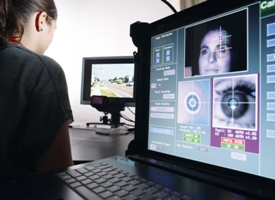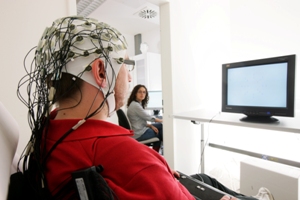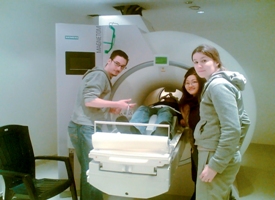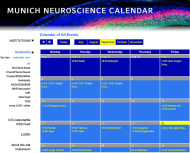Links from perception and cognition to mind and neurophilosophy
"Humans can do more than reflexively react to sensory information that is immediate and salient. We engage in complex and extended behaviors geared towards often far-removed goals. To do so, we have evolved mechanisms that can override or augment reflexive and habitual reactions in order to orchestrate behavior in accord with our intentions. These mechanisms are commonly referred to as 'cognitive' in nature and their function is to control lower level sensory, memory and/or motor operations for a common purpose" (E. Miller). How cognitive control regulates the information flow from perception to action while allowing it to be governed by current intentions is a major theme of Neurocognitive Psychology.
 One important question in this context concerns the role of consciousness in cognitive control. Common-sense psychology tells us that controlled actions are always conscious actions. S. Freud articulated a very different viewpoint: only a small fraction of control processes are performed consciously - to a much larger extent, controlled processing for perception and action goes on at an unconscious level. Experimental research in psychology and cognitive neuroscience over the last decades has given credit to Freud's general idea, while refining his view as follows. First, only so-called 'working memory' contents (and, to some extent, processes) are consciously accessible for explicit representation and verbal report. The contents of working memory are formed by 'late', integrated stages of perceptual, memory, motor, motivational (intentional), and thought processes - 'earlier', lower-level processes escape conscious representation. Second, unconscious processes in perception and decision making have a biasing influence on what is going on at the higher, conscious level within working memory; and higher conscious processes in turn control the lower-level unconscious computations in perception and action; all is consistent with the common-sense view. This concept of a bidirectional information flow between conscious and unconscious processing and its control by 'biased competition' has recently been specified in neurocomputational models. Thus, Freud's notion and the common-sense idea of cognitive control and consciousness are not incompatible; rather, they reflect different 'pathways' of control.
One important question in this context concerns the role of consciousness in cognitive control. Common-sense psychology tells us that controlled actions are always conscious actions. S. Freud articulated a very different viewpoint: only a small fraction of control processes are performed consciously - to a much larger extent, controlled processing for perception and action goes on at an unconscious level. Experimental research in psychology and cognitive neuroscience over the last decades has given credit to Freud's general idea, while refining his view as follows. First, only so-called 'working memory' contents (and, to some extent, processes) are consciously accessible for explicit representation and verbal report. The contents of working memory are formed by 'late', integrated stages of perceptual, memory, motor, motivational (intentional), and thought processes - 'earlier', lower-level processes escape conscious representation. Second, unconscious processes in perception and decision making have a biasing influence on what is going on at the higher, conscious level within working memory; and higher conscious processes in turn control the lower-level unconscious computations in perception and action; all is consistent with the common-sense view. This concept of a bidirectional information flow between conscious and unconscious processing and its control by 'biased competition' has recently been specified in neurocomputational models. Thus, Freud's notion and the common-sense idea of cognitive control and consciousness are not incompatible; rather, they reflect different 'pathways' of control.
 As an example of recent work on the role of consciousness in cognitive control, it has been shown that even simple visual search processes (finding a 'target' among other 'distractor' stimuli in a visual display) are controlled by competitive biasing mechanisms. These may be non-conscious or 'automatic' when the target differs in a single visual feature, such as a particular color or motion direction, from the distractors in the search display (e.g., the only red stimulus among green stimuli), or they may be conscious or 'voluntary' when the target differs from the distractors in a conjunction of features (e.g., the only large red stimulus among large green and small red stimuli). Control needs to be exerted in these situations when the target-defining stimulus dimension changes from one trial to the next, for example, from motion to color or vice versa. Recent fMRI studies have revealed that distinct structures in the frontal cortex are associated with the two modes of control. Conscious control (conjunction search) is associated with activity in the frontomedian cortex, including the anterior cingulate cortex, whereas non-conscious control (feature search) is associated with activity in the (left) frontopolar cortex. These centers bias the efficiency of color and, respectively, motion processing in posterior (visual-coding) areas of the brain.
As an example of recent work on the role of consciousness in cognitive control, it has been shown that even simple visual search processes (finding a 'target' among other 'distractor' stimuli in a visual display) are controlled by competitive biasing mechanisms. These may be non-conscious or 'automatic' when the target differs in a single visual feature, such as a particular color or motion direction, from the distractors in the search display (e.g., the only red stimulus among green stimuli), or they may be conscious or 'voluntary' when the target differs from the distractors in a conjunction of features (e.g., the only large red stimulus among large green and small red stimuli). Control needs to be exerted in these situations when the target-defining stimulus dimension changes from one trial to the next, for example, from motion to color or vice versa. Recent fMRI studies have revealed that distinct structures in the frontal cortex are associated with the two modes of control. Conscious control (conjunction search) is associated with activity in the frontomedian cortex, including the anterior cingulate cortex, whereas non-conscious control (feature search) is associated with activity in the (left) frontopolar cortex. These centers bias the efficiency of color and, respectively, motion processing in posterior (visual-coding) areas of the brain.
According to naturalistic philosophy, concepts such as 'free will', 'responsibility' and 'deliberate thought' should be explicated with reference to the empirically grounded insights from psychology and cognitive neuroscience. This implies, on the one hand, that deliberate decision making is conceptualized as the result of factors that are not directly reflected in conscious processing. On the other hand, conscious processing does have a strong impact on how sensory information is processed and which actions are selected and executed at lower-level unconscious stages.
 The collaboration of psychology and cognitive neuroscience with naturalistic philosophy has already brought about some progress on such issues as 'freedom of will' and 'consciousness'. However, many open questions remain - and it is reasonable to expect that the interaction of neurocognitive empirical research with philosophy within the GS of Systemic Neurosciences will help to further clarify the intricate relationship between cognitive control and consciousness. As to the scope for empirical studies in this area, the Neurocognitive Psychology research group at the LMU Munich has a record of studying cognitive control at conscious and unconscious levels using state-of-the-art experimental techniques for measurements, and intervention, at the behavioral and brain levels (e.g., EEG, RMI, TMS). On the philosophical side, the strong tradition of the philosophy of science established by W. Stegmüller and colleagues in Munich offers a natural counterpart to the empirical work. Implications of naturalistic concepts of 'free will' and 'responsibility' for ethical issues are evident and will find a natural place for reflection at the Munich 'Competence Center for Ethics'.
The collaboration of psychology and cognitive neuroscience with naturalistic philosophy has already brought about some progress on such issues as 'freedom of will' and 'consciousness'. However, many open questions remain - and it is reasonable to expect that the interaction of neurocognitive empirical research with philosophy within the GS of Systemic Neurosciences will help to further clarify the intricate relationship between cognitive control and consciousness. As to the scope for empirical studies in this area, the Neurocognitive Psychology research group at the LMU Munich has a record of studying cognitive control at conscious and unconscious levels using state-of-the-art experimental techniques for measurements, and intervention, at the behavioral and brain levels (e.g., EEG, RMI, TMS). On the philosophical side, the strong tradition of the philosophy of science established by W. Stegmüller and colleagues in Munich offers a natural counterpart to the empirical work. Implications of naturalistic concepts of 'free will' and 'responsibility' for ethical issues are evident and will find a natural place for reflection at the Munich 'Competence Center for Ethics'.





